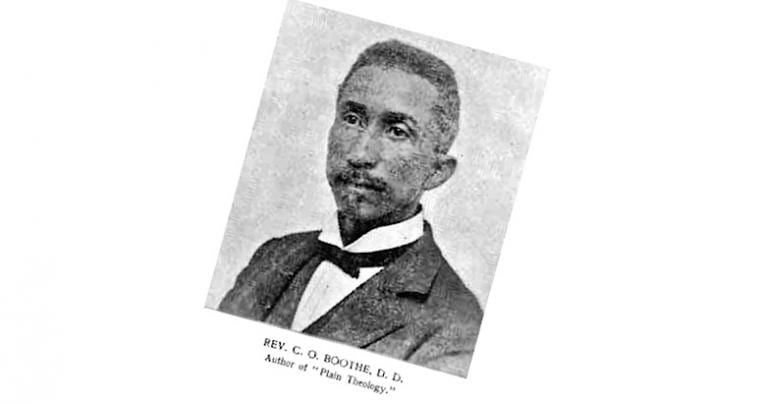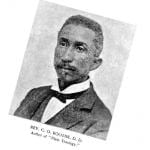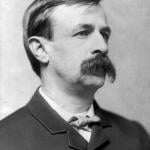 We know too little about the makers of the American mind, particularly in religion. Our roots matter if we are to grow in a healthy manner as a nation. One maker of the modern Evangelical mind was Charles Octavius Boothe, minister, scholar, educator who spoke to the “plain people” in his systemization of Biblical and historical Christianity in Plain Theology for Plain People.
We know too little about the makers of the American mind, particularly in religion. Our roots matter if we are to grow in a healthy manner as a nation. One maker of the modern Evangelical mind was Charles Octavius Boothe, minister, scholar, educator who spoke to the “plain people” in his systemization of Biblical and historical Christianity in Plain Theology for Plain People.
Being reminded of the broad Biblical basis for teachings that all Christians have in common is needful as no Christian can afford to forget the Bible for long, because there the history of God speaking to a people and then to all of us is recorded. There we find the clearest image of Jesus, God in the flesh, who helps us see the glory of God.
When I come to places of differences, I am challenged to understand better what I believe God has said in and through his Church. We must sustain these differences due to our brokenness and while they are not always lessened by clarity, they are at least made plain. When our differences are plain, we can dialog with hope of reconciliation or at the very least without exaggerating the differences we have.
Dr. Boothe explains what we now would call an Evangelical theology to what he calls plain people in plain language. When I read the complexity he still allowed himself, I am reminded that many of the plain people, steeped in King James English through the Bible and eager to learn even if they had no access or opportunity for schooling, would listen to sermons and read books more complex than many produced by Christian publishers today.
Boothe has argued for God in his unique apologetic style: thesis, Scriptural support, common objections, and then a plain response. Boothe never confuses plain or clear with simple minded and any of his readers could have followed the Scriptures he quotes or the names he cites to a deeper understanding of any of his ideas.
Boothe begins with God and God’s great creation: humankind. All of us share a glorious inheritance as part of the human race, yet any man is not what he ought to be. We fall short and only God can save us, because our problem is not merely behavioral, but-personal (ontological). We must be born again, because justice demands that Paradise not be destroyed for the angels, God, and all that is good and beautiful by our brokenness.
Boothe begins with this fall, with Adam and Eve driven from the Garden:
Justice demands that the sinners should be driven from the Garden; but before the Lord God compels them to go, he graciously sets a star of hope in their dark skies.
Boothe does not draw back from the judgment that must come to injustice, but his is a consistent note of hope:
“From the foundation of the world.” The use of this expressive phrase is worthy of special note. Dr. Justin A. Smith, in his “Commentary on Revelation,” [verse] 13: 8, says that this “is the New Testament mode of representing what took place in the remote past, before time, as measured in the periods of this world, had existence.” The phrase would be properly translated in most cases, “from eternity.” It has this meaning undoubtedly in the words of our Lord’s prayer, “Thou lovedst me before the foundation of the world” (John 17: 24).
“The purpose of grace had its origin in the love of God.” Boothe roots salvation not in wrath, though that is a fitting response to injustice, but love:
It was not what has been called “the love of complacency.” It was a love that combined pity for those who were in a very pitiable condition, and a desire to do them good by raising them out of it and establishing them in a better and happier state. It was what is termed “the love of compassion.” It was a truly wonderful love; the more we think of the sinfulness of sin, the more wonderful the love of God will appear to us. We naturally ask, “Why did God so love sinners?” and the only answer that we can give is, “Even so, Father, for so it seemed good in thy sight.” Well may we exclaim with the beloved disciple: “Behold what manner of love the Father hath bestowed upon us, that we should be called the sons of God” (1 John 3: 1).
God has an active love that redeems and restores! God does not fret, God acts. Jesus comes and dies: “to suffer in His human nature as He could not suffer as the Son of God; while his nature as the Son of God gave a value and efficiency to his suffering which it would not and could not have had in a merely human nature.” If some modern Evangelicals are forgetting the importance of the two natures of Christ, Boothe calls us back to this profound and necessary doctrine.
Having rooted the Christian message in the love of God, Boothe does not shrink back from the consequences of refusing to give our consent to God. He reminds his readers:
Those, therefore, that wish to be instrumental in leading sinners to Christ should make special efforts to impress on their minds first the solemn truth, that without the salvation that God has provided they must inevitably perish. The strongly emphatic words of the apostle should be pointed out to them, and they should be earnestly exhorted to meditate earnestly upon them until their sad meaning has been clearly comprehended.
We face doom without the work of Jesus, because of love. We cannot both refuse our consent to the good work of God and receive benefits of a relationship with the Good God. The result is to “perish” and Boothe explains:
This fearful doom is set forth in the one comprehensive word, “perish.” It means, in the case of a sinner, the end of everything that can make existence desirable. It is total and final separation from God, the source and fountain of all true blessedness; the cessation of all those pleasing anticipations that have been wont to throw their brightness on the future toward which men are always advancing; the end of all those hopes that have been to them strength in weakness, help in difficulties, comfort in sorrows, and have made endurable long and weary hours of suffering. It makes the heart sink to think of that perdition which sweeps men away from all that is bright and cheery, and leaves them no prospect to the future but what has been graphically described as the blackness of darkness forever. How infinitely precious the salvation that delivers men from such a dark and terrible doom!
Like the Bible, but unlike some preachers, Boothe neither rejects the possibility of doom nor does he dwell on it. He speaks a plain word: without Jesus we are doomed. He turns quickly to thankfulness for salvation from doom and the benefits of that salvation, if we will receive it.
Boothe is so exalted, rightly, that he does not even comment on one benefit. The great gift of fellowship remains in all caps requiring worship not exposition:
IT BRINGS THE REDEEMED ONE INTO FELLOWSHIP WITH THE FATHER, THE SON, AND THE HOLY SPIRIT; WITH ALL THE HOLY ANGELS, AND THE MULTITUDE OF THE RANSOMED SAINTS THAT SHALL ALL STAND IN SHINING ROBES AROUND THE THRONE OF GOD IN HEAVEN
————————————-












